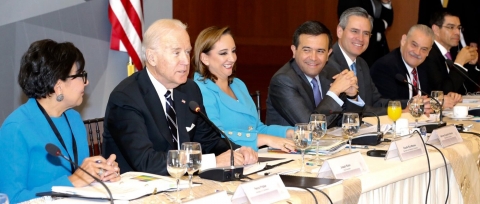Feb262016
Posted at 6:18 PM
On February 24-25, U.S. Secretary of Commerce Penny Pritzker traveled to Mexico City, Mexico, with Vice President Joe Biden and other U.S. officials for the third U.S.-Mexico High-Level Economic Dialogue (HLED).
Announced by President Obama and President Peña Nieto in 2013, the HLED is a forum through which the U.S. and Mexican governments are collaborating to advance strategic economic and commercial priorities central to promoting growth and job creation in both countries.
The U.S.-Mexico economic relationship is one of our most important in the world. Mexico is the United States’ third largest trading partner and second largest export market, while the United States is Mexico’s largest trading partner. The HLED represents an important recognition by both countries of the need to continue elevating and strengthening our economic and commercial engagement.
Since its launch three years ago, the HLED has already produced concrete results that are making it easier for our countries to do business together. Our countries continue to make significant strides in areas including: border infrastructure, mutual recognition of our trusted traders, mutual recognition of our trusted travelers, regulatory cooperation in the energy sector, the Americas Competitiveness Exchange, the U.S. and Mexican Cluster Maps, and the Bilateral Forum on Higher Education, Innovation, and Research.
A few weeks ago, Secretary Pritzker participated in the inauguration of the Tornillo-Guadalupe Port of Entry, a key accomplishment of the HLED that demonstrates our commitment to developing modern border infrastructure to support growing trade and enhance regional economic competitiveness.
To build on progress to date, the HLED has set six priority areas for 2016. The first is continuing to modernize our shared border to make sure the physical arteries between the United States and Mexico can securely support the increasing volume of goods and peoples.
The second priority is increasing energy cooperation. Access to low cost and cleaner sources of energy for our citizens, resilient energy infrastructure and a strong North American energy market are critical to the future of our two nations. A more integrated and efficient regional energy sector that relies on enhanced cooperation will play a crucial role in boosting North America’s competitiveness and leadership in the years to come.
The third priority is furthering regulatory cooperation, particularly in the energy sector. Enhanced regulatory cooperation can increase economic growth in each country; lower costs for consumers, businesses, producers and governments; increase trade in goods and services; and improve our ability to protect the environment, health and safety of our citizens.
The fourth priority is partnering for regional and global leadership. Our governments and citizens are working jointly in many strategic and institutional areas that further strengthen our bilateral ties, as well as our relationship with other countries and regions in the globalized economy.
The fifth priority is improving cooperation in the areas of innovation, entrepreneurship, higher education, and research. The future competitiveness of our region depends on our ability to foster innovation, provide our citizens access to high quality education, and to promote a workforce with the skills necessary to succeed in the global economy.
The final priority is institutionalizing the HLED, to ensure cooperation between our governments on important issues over the long-term. Both governments are putting in place mechanisms to ensure cooperation on important issues continues over the long-term, including the U.S. Mexico Energy Business Council and the U.S. Border Crossing Infrastructure Prioritization Council.
The HLED will remain an inclusive and transparent process. U.S. and Mexican government officials regularly review recommendations made by various stakeholder groups. Our governments will continue to conduct outreach events to receive feedback on the HLED and emphasize the importance of the relationship.


